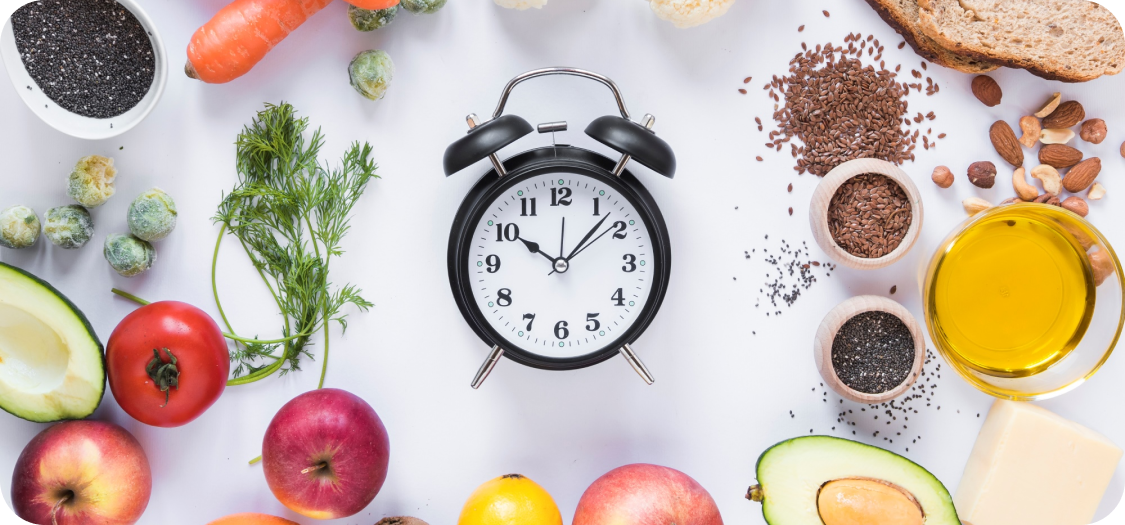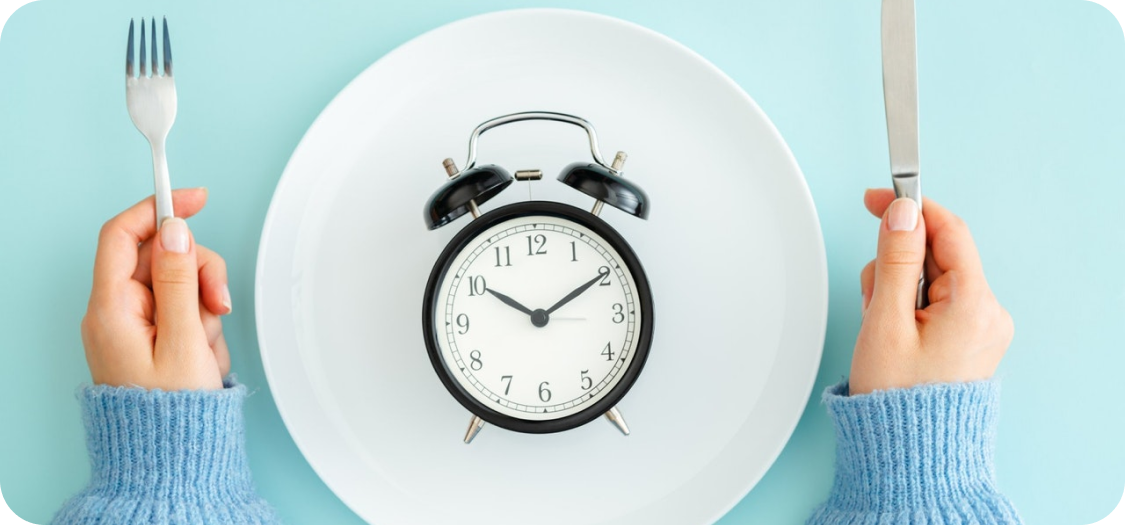Intermittent Fasting Calculator
Gender, Age, Weight, Height, Activity Level, and type of fasting
Intermittent fasting (IF) has gained popularity in recent years for its numerous health benefits. It’s a game-changer for those aiming to lose weight. However, there are so many IF methods that it can get confusing when and how much to eat for each meal.
Our health and weight loss journies are personal endeavours, and no two paths are the same. That's why we developed an Intermittent Fasting Calculator that isn't just about numbers; it's about you, your unique characteristics, and your chosen approach to intermittent fasting.
How it Works?
Using your inputs, this Intermittent Fasting Calculator computes your calorie requirements and Total Daily Energy Expenditure (TDEE) to make the best recommendations.
- Calculate Basal Metabolic Rate (BMR): The BMR is calculated using key user inputs such as age, weight, height, and gender. BMR represents the number of calories the body requires at rest to maintain essential physiological functions. By understanding this baseline, the calculator establishes a solid foundation for subsequent calculations.
- Calculate Total Daily Energy Expenditure: This is the total number of calories your body needs in a day to maintain your current weight. This is based on your BMR and your activity levels. TDEE is an important concept for understanding how many calories you should consume to maintain, lose, or gain weight based on your lifestyle and goals.
- Calorie Intake for Intermittent Fasting Methods: What sets this Intermittent Fasting Calculator apart lies in its ability to customize caloric recommendations based on different fasting methods such as:
- 16/8: a daily fast for 16 hours, leaving an 8-hour window for eating.
- 18/6: a daily fast for 18 hours, leaving a 6-hour window for eating.
- 20/4: a daily fast for 20 hours, leaving a 4-hour window for eating.
- One Meal a Day (OMAD): You eat only one meal a day and fast for the rest of the day.
- 5:2 diet: You can eat normally for five days and then drastically reduce your calorie intake, to around 500-650 calories, on two non-consecutive days.
- Alternate day fasting: You alternate between days of normal eating and days with restricted calorie intake.
Once you add your inputs and select a fasting duration, the calculator dynamically adjusts your recommended calorie intake and generates your eating window. This is the period during which you can consume your meals and snacks.
Whether you're an early bird or a night owl, intermittent fasting can be adapted to fit your lifestyle. You can experiment with different start times and fasting durations, on this intermittent fasting weight loss calculator, to find what works best for you.
We also have a sugar intake calculator that helps you find out exactly how much sugar you can safely have every day.
What is Intermittent Fasting?
Intermittent fasting (IF) is a dietary pattern that alternates between periods of eating and fasting. The goal is to create a time-restricted eating window for consuming your meals. During the fasting period, you have to abstain from food.
The Logic Behind It
While traditional diets focus on what to eat, intermittent fasting focuses on when to eat. By restricting the time window for eating, this dietary strategy enables your body to use stored fat as a source of energy.
When you fast for an extended time, for 16, 18, 20 hours, or more, your insulin levels drop, and your body turns to burning stored fat for energy.
What Can I Consume While Fasting?
During the fasting periods, do not have anything that will trigger an insulin release. It's best to stick to zero-calorie beverages such as water, black coffee, and herbal tea. Do not add any milk, sugar, or other additives to your drinks. You can also add lemon juice or ACV to your drinks.
Is It Good for Weight Loss?
Yes, intermittent fasting is good for weight loss as it promotes calorie restriction and fat burning. Having a fixed eating window helps reduce your calorie intake. Training yourself to eat in this window helps you develop discipline and build willpower. This helps deal with food cravings and breaking of unhealthy food habits that may have contributed to the unwanted weight gain.
For sustained weight loss, such lifestyle changes will be needed. As long as you make mindful and healthy choices during your eating window, IF is effective in boosting weight loss. However, individual results may vary.
5 Benefits of Intermittent Fasting
Intermittent fasting offers numerous health benefits such as:
- Weight Loss: As discussed before, intermittent fasting helps create the calorie deficit needed for losing unwanted body fat. Additionally, stored fat gets mobilized for energy during the fasting window. This further contributes to the reduction of body fat.
- Improves metabolic health: Intermittent fasting has been associated with improved insulin sensitivity. By regulating your blood sugar levels more effectively, IF may contribute to improved metabolic health. During fasting periods, your insulin levels drop. This allows your cells to develop more responsive to insulin. Over time, this can lower the risk of insulin resistance, a condition linked to type 2 diabetes.
- Autophagy: Intermittent fasting has been found to trigger a cellular repair process known as autophagy. During autophagy, cells remove damaged components and recycle them. This process is crucial for maintaining cellular health and has been linked to a reduced risk of various neurodegenerative diseases, and even some types of cancer.
- Heart Health: Considering that IF can lead to weight loss, improved insulin sensitivity, and reduced inflammation, it comes as no surprise that IF improves your heart health. IF has also been linked to lower levels of triglycerides and blood pressure, further supporting cardiovascular health.
- Brain Health: Some studies suggest that intermittent fasting may have positive effects on brain health. Fasting may stimulate the production of brain-derived neurotrophic factor (BDNF), a protein associated with cognitive function, learning, and memory.
How to Manage Hunger during Fasting?
If you are new to fasting, you may find it difficult to manage your hunger during the fasting period. Here are some beginner tips for first-timers, to help you deal with those hunger pangs and wait till your eating window begins:
- Choose the right method: There are various intermittent fasting methods, such as the 16/8 method, OMAD, alternate-day fasting, and so on. Choose a method that aligns with your lifestyle and preferences.
- Listen to your body: If you feel dizzy or unwell during a fasting period, it's important to listen to your body and break your fast if needed. You need to allow your body to adapt to fasting durations without causing unnecessary stress.
- Gradual adjustment: Do not aim for 20-hour fasts or alternate-day fasting regimens when you start out. Aim for a late breakfast and an early dinner with a fasting window of 12 to 14 hours. Do this for a few days and then gradually increase the fasting duration to 16, 18, or even 20 hours. Once your system adapts to this, you can try alternate-day fasting or even 48-hour fasts.
- Stay Consistent: Eventually, you should be able to establish a regular eating and fasting schedule that fits into your daily routine. Now, you need to be consistent as this helps your body adapt to the new pattern and enhances the effectiveness of intermittent fasting.
- Stay Hydrated: You are allowed to drink fluids during your fasting window as long as these don’t spike your insulin levels. Safe bets include water, herbal teas, and black coffee.
- Schedule your workouts: Plan your workouts near your eating window can have some protein shakes as pre or postworkout drinks. Adding coffee to your protein drink helps boost your energy and workout performance. If you are having protein shakes on rest days, adjust your remaining calorie intake accordingly. You can try our Protein Coffee to fulfil this need.
- Choose Filling Foods: During your eating window, it's best to avoid high-carb and sugary foods as they spike insulin too much. Your blood sugar levels will rise fast and then crash leaving you feeling even more hungry. Ensure your meals are high in protein and have adequate amounts of healthy fats. Such meals are satiating and take time to digest. Learn how much protein can you absorb at once here. High-fiber foods can also keep you feeling full for longer.




































